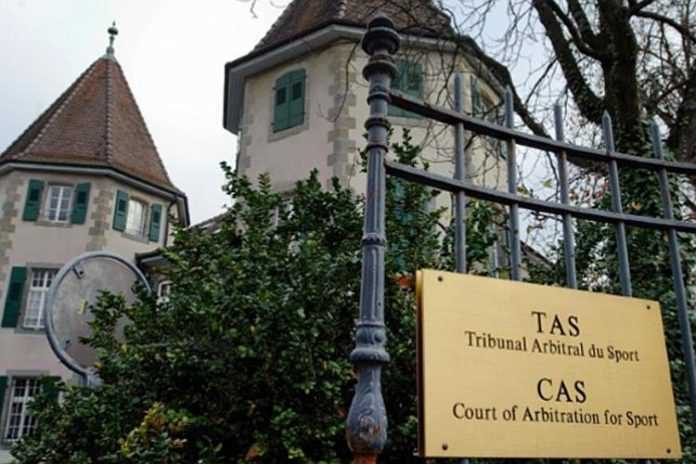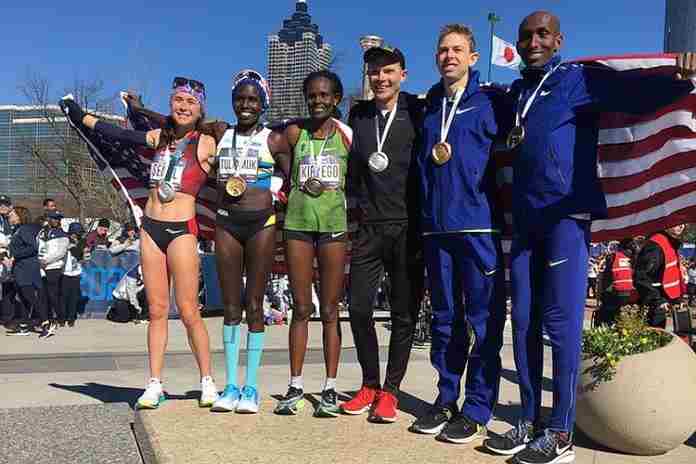The latest news, notes and quotes from the worldwide Five-Ring Circus:
● Court Watch I: Yang Sun suspended for 8 years ● The Court of Arbitration for Sport (CAS) finally announced its decision in the Yang Sun case, finding the three-time Olympic champion violated the World Anti-Doping Code and imposed an eight-year suspension from international competition.
The heavy sentence was levied because this was Sun’s second doping-rules offense; he had previously been sanctioned in 2014 and the anti-doping rules of the international federation for aquatics (FINA) call for an eight-year ban.
The three-member arbitration panel was unanimous that Sun had violated the FINA rules dealing with “tampering with any part of Doping Control,” noting
“[T]he Athlete failed to establish that he had a compelling justification to destroy his sample collection containers and forego the doping control when, in his opinion, the collection protocol was not in compliance with the ISTI [International Standard for Testing & Investigations]. As the Panel noted, it is one thing, having provided a blood sample, to question the accreditation of the testing personnel while keeping the intact samples in the possession of the testing authorities; it is quite another thing, after lengthy exchanges and warnings as to the consequences, to act in such a way that results in destroying the sample containers, thereby eliminating any chance of testing the sample at a later stage.”
Sun was visited by doping control officers in September 2018 at his home. He did provide a blood sample, but refused to provide a urine sample and questioned the authenticity of the doping-control team. The blood sample was destroyed before the doping-control team left and while the FINA Doping Panel ruled that the collection procedures were invalid, the World Anti-Doping Agency appealed.
It’s worthwhile to note that Sun did not fail any test. In fact, the CAS Panel specifically noted that Sun’s wins at the 2019 World Aquatics Championships in the 200 and 400 m Freestyles were not to be invalidated. But not providing a sample is, for him, just as bad as a failed test.
Sun has promised to appeal the CAS decision to the Swiss Federal Tribunal, but his chances there are poor. Now 28, he will not be eligible for another international championship until 2028, when he will be 36.
The Court issued only a news release on the decision on Friday, and stated that the detailed decision would be available soon “unless the parties agree that it should remain confidential.” Let’s hope not.
Interestingly, CAS agreed with another appeal in swimming, but annulled a four-year ban last Thursday on Italian swimmer Filippo Magnini. The Italian national anti-doping organization had found Magnini – based on a criminal investigation into doping by Italian authorities in 2015 – had participated in a “Use or Attempted Use by an Athlete of a Prohibited Substance or a Prohibited Method” and banned him for four years. Magnini, now 38 and retired, won the 100 m Free at the 2005 and 2007 World Championships.
● Court Watch II: CAS sets Russia sanctions appeals timeline ●The Russian appeal of the four-year sanction handed out by WADA is now in process at the Court of Arbitration for Sport, with a three-member panel named and a large group of “interested parties” getting ready to submit arguments.
With the Tokyo Games coming in late July, the timetable allows for written submissions until the middle of April and a hearing “which will not take place before the end of April 2020.” WADA had asked for the heating to be public, but will not be due to “the absence of an agreement between all parties concerned.” Any doubt as to who objected?
The added parties include the International Olympic Committee, International Paralympic Committee, Russian Olympic Committee, Russian Paralympic Committee, International Ice Hockey Federation and multiple individual Russian athletes (who were not named).
The strategy from the Russian Anti-Doping Agency and other Russian parties has been clear since the WADA decision was confirmed last December: delay, possibly long enough to allow Russian athletes to compete in Tokyo 2020. But if the CAS hearing can be held before the end of April, it’s not unreasonable to expect a decision – an announcement, not the detailed explanation – within a couple of months. That would be around 1 July, before the Olympic Village opens and with insufficient time for an appeal to the Swiss Federal Tribunal.
● Athletics ● The drumbeat of doping positives being reported by the Athletics Integrity Unit continues unabated. Within the last week, Kenyan distance runner Kenneth Kiprop Kipkemboi – a 2:05:44 marathoner in 2018 and the 2012 African Champion in the 10,000 m – was charged with testing for a prohibited substance, and Ukranian 800 m runner Nataliia Krol (1:59.70 best) was alleged to have used a prohibited substance.
Moreover, in an interview with the British site Telegraph.com, Brett Clothier (AUS), the AIU chief, said that dopinghas been “rampant” among professional marathoners:
“We did a statistical study that showed that, in 2018, of all the marathon races around the world outside of the six major marathons, something like 70% to 80% of the podium finishers didn’t have any out-of-competition tests in the nine months leading up to the race.
“There was just no testing. Not only that, but the athletes weren’t in a testing pool so they knew no-one was going to test them.”
Clothier said that “Based on what has happened in the past, yes, for sure there will be cases before the Olympics that will shock people.” Stay tuned.
● Coronavirus update ● The continued spread of the coronavirus around the world is impacting events everywhere, with no end in sight. In the past few days:
● Switzerland: The Swissinfo.ch site reported that “Switzerland has imposed a ban on public events that gather more than 1,000 people together in the same place until at least March 15 in response to the coronavirus threat.”
● Italy: The FIS Alpine World Cup Finals scheduled to be held in March in Cortina d’Ampezzo will go on as scheduled, but – for now – without spectators. Multiple league football matches in Serie A and Serie B will also be held without spectators this weekend.
● Korea: The ISU World Short-Track Championships, set to be held in Seoul in mid-March, was canceled last Wednesday. The International Table Tennis Federation postponed its World Championships in Busan from mid-March to late June.
You can follow the worldwide status of the disease on the Johns Hopkins CSSE dashboard here.
● Games of the XXXII Olympiad: Tokyo 2020 ● The chief executive of Discovery, Inc., the parent company of hit U.S. networks like Discovery, TLC, Food Network and the owner of the European rights to the 2020 Olympic Games in Tokyo, said on Thursday that even a cancellation of the Games would not impact the company’s financial performance.
The New York Post reported former NBC executive David Zaslav as noting, “It won’t have an adverse impact on financials.” Discovery’s revenue for the fourth quarter of 2019 was $2.87 billion, with net income of $476 million. Eurosport, which is 51% owned by Discovery, bought the pan-European rights to the 2016-18-20-22-24 games for 1.3 billion Euro (~$1.43 billion U.S.) in 2015.
● Vox Populi ● More on our Heard at Halftime column from last Tuesday on the passing of legendary track & field businessman and statistician Dick Bank from Los Angeles-area coach Ron Brumel:
“As one who came of age during the era between, 1960-64, I remember Mr. Bank doing commentary on Wide World of Sports, ABC’s weekly anthology.
“Back then, indoor track was huge, and Jim Beatty, the first indoor sub-4 minute miler, was a main attraction. His races with Tom O’Hara and many others were a weekly draw, and Dick (alongside host Jim McKay), would breathlessly comment on the splits of the race, strategy, and other trivia of track nuttiness.
“As for Mills:
“I first noticed him at the 1963 National XC Championship at Van Courtlandt Park in the Bronx, still (IMO) the classic American XC course, with both rolling and steep hills, and many long stretches upon which to make surging moves.
“It was my first time seeing world class distance runners up close, and me and my track nut friend, Mitch Edison, ran up and down the hills at various angles to catch the runners as they came by different stretches of the course.
“The race was between American Pete McArdle, and young Canadian phenom Bruce Kidd. I’ll never forget the final stretch with those two fighting it out to the end. Honestly, I don’t remember who won, just the battle, and back in third place, an unknown Marine named Billy Mills, maybe a good 100 yards behind the first two.
“Edison pointed him out to me, saying, ‘watch that Mills guy, he ran a great race.’ And of course, the following summer, after being the third American in the 10,000 meters in the Olympic Trials, upset the world at Tokyo.
“Such a great part of American history. Will our high school kids have memories like this, or is the sport forever tainted by professionalism and cheating coaches?
“All of the Mills’s are now out of the East African contingencies, only they’re running unfathomable times as teenagers. So it goes.”


























